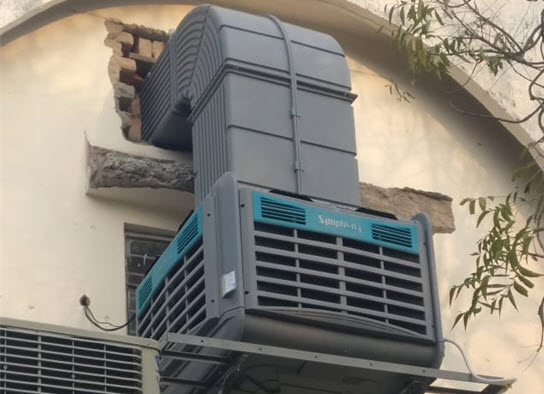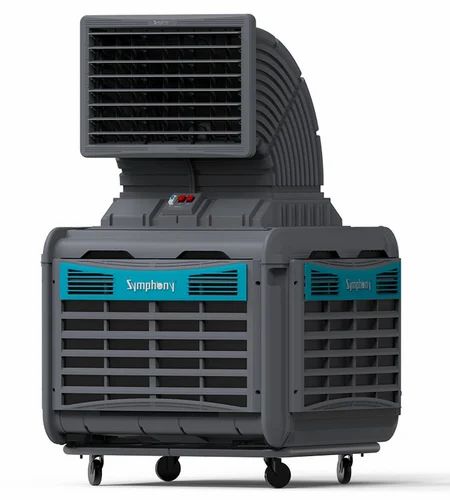Maximizing Office Comfort: How Industrial Coolers Ensure Cooling Efficiency

Maintaining a comfortable temperature in an office environment is essential for employee productivity and well-being. Industrial coolers, also known as evaporative coolers or swamp coolers, offer an efficient solution for keeping office spaces cool and comfortable around the clock. These coolers are particularly effective in hot and dry climates, providing a cost-effective and eco-friendly alternative to ACs.
What Are Industrial Coolers?
Industrial coolers use the natural process of evaporation to cool the air. They draw in warm air, pass it through water-soaked pads, and then blow the cooled air into the office space. This method not only cools the air but also adds moisture, improving air quality in dry environments.
Key Benefits of Industrial Coolers
- Energy Efficiency: Industrial coolers consume significantly less energy compared to traditional HVAC units. This efficiency translates into lower electricity bills and a reduced carbon footprint.
- Cost-Effective Installation and Maintenance: These coolers are generally more affordable to install and maintain. Their simple design means fewer components that can break down, leading to lower maintenance costs.
- Improved Air Quality: By adding moisture to the air, industrial coolers can alleviate issues related to dry air, such as respiratory problems, dry skin, and eye irritation. This added humidity can also help preserve office equipment and furniture.
- Continuous Operation: Designed for continuous use, industrial coolers can keep the office environment cool 24/7 without the need for frequent shut-downs for maintenance or repairs.
- Eco-Friendly: Since they use water as a cooling medium and consume less electricity, industrial coolers are environmentally friendly. They do not use refrigerants, which are harmful to the ozone layer.
How Industrial Coolers Keep the Office Cool
- Efficient Air Circulation: Industrial coolers are designed to provide a steady flow of cool air throughout large spaces. This circulation ensures that every corner of the office remains at a comfortable temperature.
- Large Cooling Capacity: These coolers can handle substantial volumes of air, making them suitable for large office spaces with many employees and equipment generating heat.
- Customizable Cooling Options: Many industrial coolers come with adjustable settings, allowing for customized cooling solutions based on specific office needs and varying outdoor temperatures.
- Strategic Placement: Placing industrial coolers in strategic locations within the office ensures optimal airflow and even cooling. Positioning them near heat sources or in high-traffic areas can enhance their effectiveness.
- Low Noise Levels: Unlike some traditional HVAC units, industrial coolers operate quietly, maintaining a peaceful work environment without the distraction of constant noise.

Implementing Industrial Coolers in Your Office
To effectively implement industrial coolers in your office, consider the following steps:
- Assess Cooling Needs: Evaluate the size of your office, the number of employees, and the amount of heat-generating equipment to determine the cooling capacity required.
- Choose the Right Cooler: Select an industrial cooler that matches your office’s cooling needs. Consider factors such as airflow rate, water tank capacity, and energy efficiency.
- Professional Installation: Ensure that the cooler is installed by professionals who can strategically place the units for maximum efficiency and minimal disruption.
- Regular Maintenance: Schedule regular maintenance to keep the coolers operating at peak efficiency. This includes cleaning the pads, checking water levels, and inspecting the fan and motor.
- Employee Training: Educate employees on the proper use of industrial coolers, including adjusting settings and reporting any issues promptly.
Conclusion
Industrial coolers are a reliable and efficient solution for maintaining a comfortable office environment around the clock. Their energy efficiency, cost-effectiveness, and ability to improve air quality make them an excellent choice for businesses looking to enhance employee comfort and productivity. By implementing industrial coolers, you can ensure a consistently cool and pleasant workspace, contributing to the overall success and well-being of your office.
FAQs - Industrial Coolers
Industrial coolers consume significantly less energy than traditional HVAC, making them a more cost-effective and eco-friendly option for cooling large spaces.
Industrial coolers are most effective in hot and dry climates. In areas with high humidity, their cooling efficiency may be reduced.
Regular maintenance should be performed at least once a season, including cleaning the cooling pads, checking water levels, and inspecting the fan and motor for optimal performance.
Yes, industrial coolers can be used alongside AC systems to enhance cooling efficiency and reduce overall energy consumption.
The main components of an industrial cooler include a fan, water pump, cooling pads, and a water reservoir. These work together to cool and circulate air through the office space.
